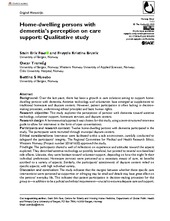| dc.contributor.author | Fæø, Stein Erik | en_US |
| dc.contributor.author | Bruvik, Frøydis Kristine | en_US |
| dc.contributor.author | Tranvåg, Oscar | en_US |
| dc.contributor.author | Husebø, Bettina | en_US |
| dc.date.accessioned | 2020-07-02T11:45:58Z | |
| dc.date.available | 2020-07-02T11:45:58Z | |
| dc.date.issued | 2020 | |
| dc.Published | Fæø SE, Bruvik FK, Tranvåg O, Husebø BS. Home dwelling persons with dementia's perception on care support: Qualitative study. Nursing Ethics. 2020;27(4):991–1002 | eng |
| dc.identifier.issn | 1477-0989 | |
| dc.identifier.issn | 0969-7330 | |
| dc.identifier.uri | https://hdl.handle.net/1956/23252 | |
| dc.description.abstract | Background: Over the last years, there has been a growth in care solutions aiming to support home-dwelling persons with dementia. Assistive technology and voluntarism have emerged as supplements to traditional homecare and daycare centers. However, patient participation is often lacking in decision-making processes, undermining ethical principles and basic human rights. Research objective: This study explores the perceptions of persons with dementia toward assistive technology, volunteer support, homecare services, and daycare centers. Research design: A hermeneutical approach was chosen for this study, using a semi-structured interview guide to allow for interviews in the form of open conversations. Participants and research context: Twelve home-dwelling persons with dementia participated in the study. The participants were recruited through municipal daycare centers. Ethical considerations: Interviews were facilitated within a safe environment, carefully conducted to safeguard the participants’ integrity. The Regional Committee for Medical and Health Research Ethics, Western Norway (Project number 2016/1630) approved the study. Findings: The participants shared a well of reflections on experience and attitudes toward the aspects explored. They described assistive technology as possibly beneficial, but pointed to several non-beneficial side effects. Likewise, they were hesitant toward volunteer support, depending on how this might fit their individual preferences. Homecare services were perceived as a necessary means of care, its benefits ascribed to a variety of aspects. Similarly, the participants’ assessments of daycare centers relied on specific aspects, with high individual variety. Discussion and conclusion: The study indicates that the margins between whether these specific care interventions were perceived as supportive or infringing may be small and details may have great effect on the persons’ everyday life. This indicates that patient participation in decision-making processes for this group is—in addition to be a judicial and ethical requirement—crucial to ensure adequate care and support. | en_US |
| dc.language.iso | eng | eng |
| dc.publisher | Sage | eng |
| dc.relation.uri | https://journals.sagepub.com/doi/pdf/10.1177/0969733019893098 | |
| dc.rights | Attribution CC BY | eng |
| dc.rights.uri | http://creativecommons.org/licenses/by/4.0 | eng |
| dc.title | Home dwelling persons with dementia's perception on care support: Qualitative study | en_US |
| dc.type | Peer reviewed | |
| dc.type | Journal article | |
| dc.date.updated | 2020-01-28T08:20:49Z | |
| dc.description.version | publishedVersion | en_US |
| dc.rights.holder | Copyright 2020 The Author(s) | |
| dc.identifier.doi | https://doi.org/10.1177/0969733019893098 | |
| dc.identifier.cristin | 1783688 | |
| dc.source.journal | Nursing Ethics | |
| dc.source.pagenumber | 991-1002 | |
| dc.relation.project | ExtraStiftelsen: 2016/FO77186 | |
| dc.identifier.citation | Nursing Ethics. 2020, 27 (4), 991-1002. | |
| dc.source.volume | 27 | |
| dc.source.issue | 4 | |

